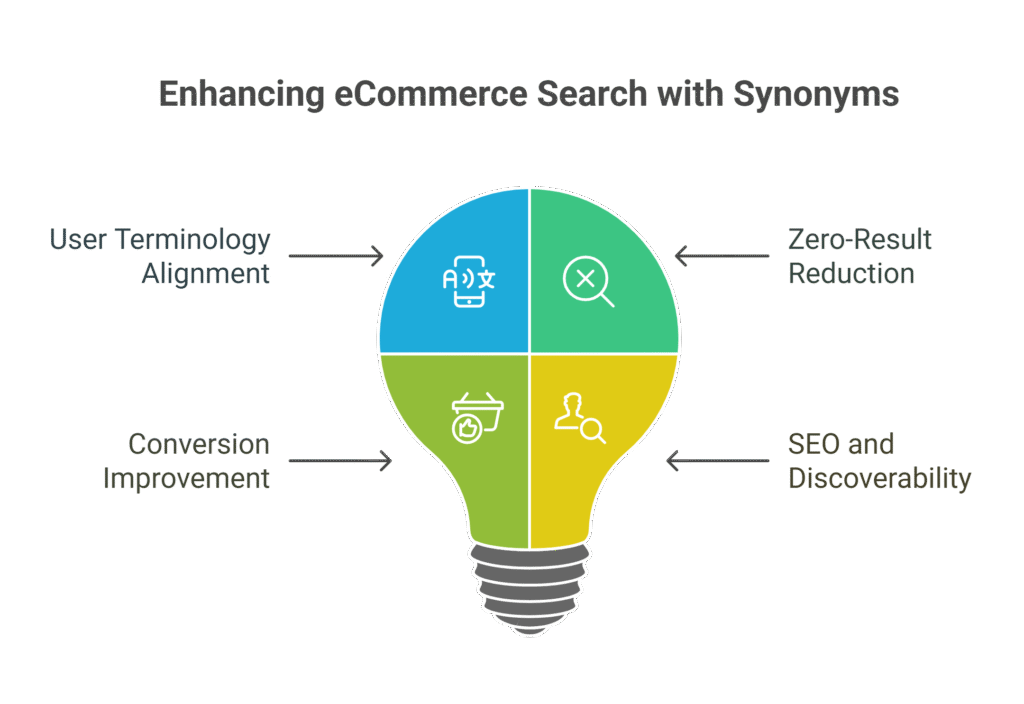Imagine this: a shopper types “sneakers” on your eCommerce site, but your product listings only say “running shoes.” Or they type “sofa”, while your inventory uses “couch.” What happens? No results. No sale.
That’s not just poor UX, it’s revenue left on the table.
Enter automatic synonyms, the unsung hero of modern eCommerce search. These AI-powered systems recognize that different people use different words for the same thing and they bridge the linguistic gap between search queries and product catalogs.
Let’s break down what automatic synonyms are, how they work, and why your eCommerce platform desperately needs them.
What Are Automatic Synonyms?
Automatic synonyms are AI-generated or machine-learned mappings between different words that carry similar meanings.
In eCommerce, this means:
- “laptop” = “notebook”
- “pants” = “trousers”
- “mobile” = “smartphone”
When a user searches with a synonym not explicitly listed in your product title or description, automatic synonym systems expand the query behind the scenes to include those variations, ensuring accurate results.
Why They Matter in eCommerce Search

1. Users Don’t Use Your Terminology
Internal teams label products in one way. Customers describe them differently. Automatic synonyms close that disconnect in real-time.
2. Reduces Zero-Result Pages
A shopper searching for “hoodie” shouldn’t see a dead end just because your listings say “sweatshirt.” Synonyms drastically reduce friction and bounce rates.
3. Improves Conversions
When people find exactly what they’re looking for, regardless of phrasing, they’re more likely to complete the purchase.
4. Boosts SEO and Internal Discoverability
Even on-site search queries feed into future content strategy. Synonym mapping helps capture and utilize this intent-rich data.
How Automatic Synonyms Work
Machine Learning Models
Systems scan large volumes of search logs, click data, and product descriptions to identify patterns of interchangeable terms.
Natural Language Processing (NLP)
NLP enables contextual understanding, so a system knows that “Apple” might mean fruit or a tech brand, depending on the page.
Synonym Expansion
When a user types “car”, the system silently includes “vehicle”, “automobile”, and other variants in the backend query, without bloating the UX.
Manual vs. Automatic Synonyms
| Feature | Manual Synonyms | Automatic Synonyms |
|---|---|---|
| Setup | Manual, time-consuming | Automated with AI |
| Coverage | Limited | Broad, dynamic |
| Maintenance | Requires updates | Self-learning and adaptive |
| Scalability | Poor | Excellent |
| Personalization Potential | None | High (can adapt to user behavior) |
If you’re still managing synonyms manually in 2025, you’re losing scale and sales.
Use Cases in Real eCommerce Environments
- Fashion Retail: “joggers” vs. “sweatpants”
- Electronics: “cell phone” vs. “smartphone” vs. “mobile”
- Furniture: “futon” vs. “sofa bed”
- Automotive: “car tires” vs. “vehicle wheels”
Shoppers are all saying the same thing, but with different words. Your search engine must understand them all.
Pro Tip: Pair Synonyms with Search Analytics
Automatic synonym systems shine brightest when paired with user behavior data. Watch which queries lead to no clicks, and feed them back into your system to grow smarter over time.
Expertrec: Smart Search with Built-In Automatic Synonyms
If you’re looking for an eCommerce search engine that handles automatic synonym mapping without lifting a finger, Expertrec is your best bet.
Here’s What Expertrec Offers:
- Automatic Synonym Engine
No manual configuration needed. It learns from user queries and maps intent to catalog language intelligently. - Real-Time Query Expansion
Search results are enriched on-the-fly based on known synonyms, no performance lag. - Custom Synonym Rules (Optional)
You can override or fine-tune mappings for industry-specific terms (e.g., “e-bike” = “electric bicycle”). - Plug-and-Play Integration
Works with Shopify, Magento, WooCommerce, BigCommerce, and custom stacks.
Expertrec’s system doesn’t just show results. It understands language, automatically.
Conclusion: Every Word Counts
In eCommerce, one missed synonym can mean hundreds of missed sales. Automatic synonym technology ensures your site speaks every shopper’s language—whether they call it a “handbag”, “purse”, or “satchel.”
Don’t lose customers over semantics.
Let Expertrec do the heavy lifting, so your search becomes a sales engine.
Frequently Asked Questions
1. What are automatic synonyms in eCommerce search?
They are AI-detected word variations that ensure users find relevant products regardless of wording differences.
2. How do automatic synonyms improve conversions?
By reducing no-result pages and improving relevance, users are more likely to find what they want—and buy it.
3. Can I add my own custom synonyms with Expertrec?
Yes. While Expertrec handles synonyms automatically, you can manually input domain-specific terms too.
4. Is this feature useful for multilingual eCommerce?
Absolutely. Synonym mapping extends across languages and dialects, depending on your site’s content and user data.
5. How is Expertrec different from standard search tools?
Expertrec includes out-of-the-box NLP and automatic synonym intelligence—meaning less work for you and better results for your shoppers.




